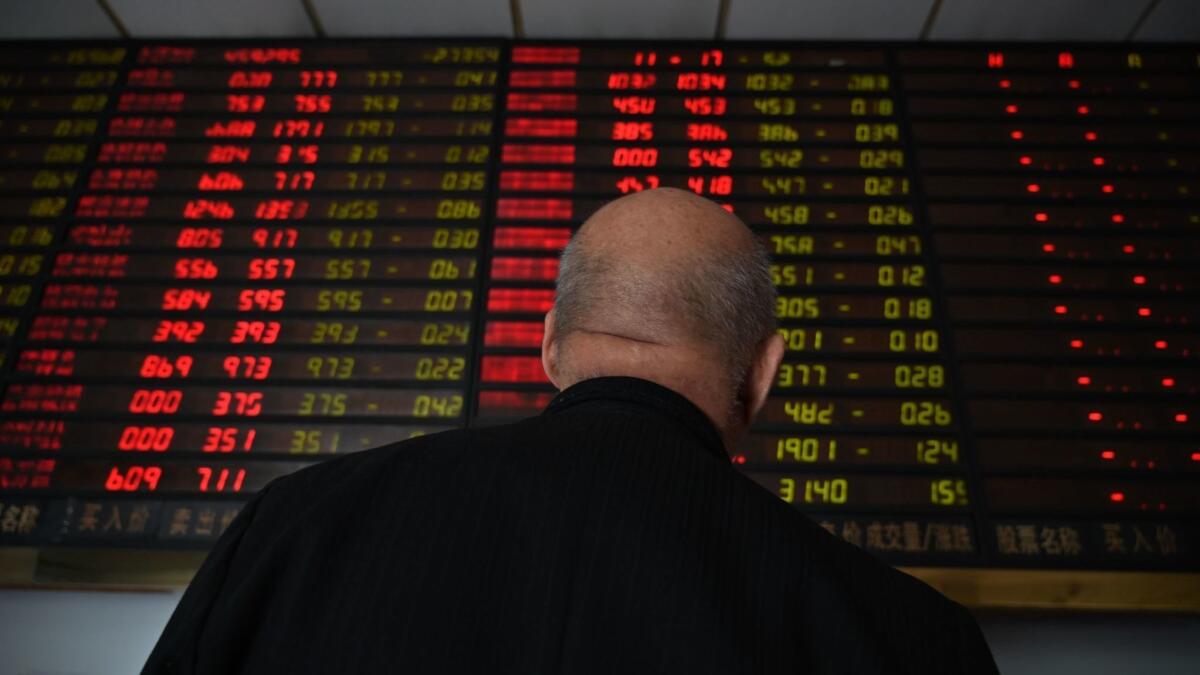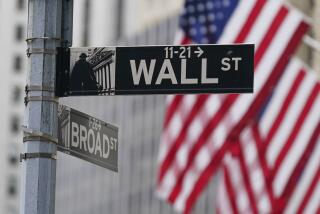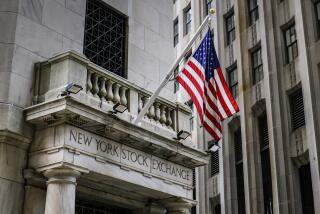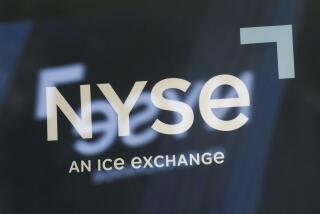Stocks fall after Trump threatens to raise tariffs on Chinese goods

Fresh market jitters over the possibility of an escalation in the U.S.-China trade war pulled stocks on Wall Street broadly lower Monday.
President Trump threatened over the weekend to raise tariffs on goods imported from China. He complained that the trade talks between the two countries were moving too slowly.
Stocks slumped early in the day but then gradually recovered a good portion of the losses, a sign that investors still had hopes of a trade deal. China remained committed to sending a delegation to talks this week in Washington despite the Trump threat, and some investors appeared to conclude that the president’s warning was just more high-stakes posturing.
However, after the market closed, U.S. Trade Representative Robert Lighthizer said that the tariff increases would take effect at 12:01 a.m. Eastern time Friday. He did say negotiations would resume Thursday in Washington.
The ratcheting up of the trade rhetoric from Washington came after the United States and China sent signals in recent months that talks on resolving the dispute were progressing.
Hopes for an accord between the world’s two largest economies contributed to the big run-up in stock prices in the United States and China so far this year. The Standard & Poor’s 500 index and Nasdaq composite hit all-time highs last week.
However, investors have gotten their hopes up that the trade issue was close to being resolved a number of times in recent months, only to be disappointed when new flare-ups arose.
U.S. companies with heavy business interests in China bore the brunt of the selling Monday, particularly technology and industrial companies. Banks also fell sharply. Healthcare stocks rose.
The S&P 500 fell 13.17 points, or 0.4%, to 2,932.47. At one point in the day, the benchmark index was down 1.6%.
The Dow Jones industrial average fell 66.47 points, or 0.3%, to 26,438.48. It was down as much as 471 points in the first few minutes of trading.
“You’ve seen that the sell-off has been so far contained, and part of that is the perception that the president has done this before,” said Marina Severinovsky, investment strategist at Schroders.
The Nasdaq slid 40.71 points, or 0.5%, to 8,123.29. The Russell 2000 index of small-company stocks bucked the trend, edging up 0.95 of a point, or 0.1%, to 1,614.98.
Major indexes in Europe and Asia lost ground.
The United States and China have raised tariffs on tens of billions of dollars’ worth of each other’s goods in their dispute over U.S. complaints about Chinese technology ambitions.
Trump turned up the heat Sunday when he threatened to raise tariffs on imports from China to 25% from 10%. He also said he would impose tariffs on an additional $325 billion in imports from China, covering everything the country ships annually to the United States.
Tariffs currently in place have already raised costs on goods for companies and consumers, and disrupted trade in goods such as soybeans and medical equipment.
Many sectors of the market posted declines Monday, including technology, industrial and materials companies, retailers and banks.
Qualcomm, which — according to data provider FactSet — gets nearly two-thirds of its revenue from China, fell 1.2%. Broadcom slid 1.3%. Apple lost 1.5%.
Chipmakers Micron Technology and Advanced Micro Devices each declined 2.8%.
Industrial behemoth Caterpillar lost 1.7%. Deere & Co. slid 4%.
Wynn Resorts, with a host of casinos and hotels in Macau, gets about three-quarters of its revenue from China. Its stock tumbled 4.1%.
Investors fled to safer holdings. Bond prices rose, sending the 10-year Treasury yield down to 2.50% from 2.53%.
Chinese indexes plunged. The Shanghai composite index sank 5.6%, and Hong Kong’s Hang Seng index lost 2.9%. European indexes fell broadly.
Shares of Chinese companies that trade in the United States also fell. JD.com slid 4.5%. Internet search company Baidu declined 1.5%.
Investors have been digesting mixed reports about the U.S.-China trade talks for months and have largely discounted concerns about a failure in negotiations. The broader market has been posting gains all year on encouraging economic growth and solid corporate earnings results.
Elsewhere in the market, Boeing fell 1.3% after it disclosed that it did not warn airlines about a faulty safety alert until after one of its planes crashed.
The sensors malfunctioned during an October flight in Indonesia and another in March in Ethiopia, causing software on the plane to push the nose down. Pilots were unable to regain control of either plane and both crashed, killing 346 people.
Energy futures closed mostly lower. Benchmark U.S. crude rose 0.5% to $62.25 a barrel. Brent crude, the international standard, gained 0.6% to $71.24 a barrel.
Wholesale gasoline fell 1.5% to $2 a gallon. Heating oil slipped 0.1% to $2.07 a gallon. Natural gas dropped 1.7% to $2.52 per 1,000 cubic feet.
Gold rose 0.2% to $1,283.80 an ounce. Silver fell 0.3% to $14.93 an ounce. Copper rose 0.4% to $2.83 a pound.
The dollar weakened to 110.90 Japanese yen from 111.09 yen. The euro strengthened to $1.1203 from $1.1194.






